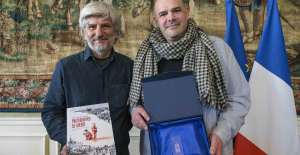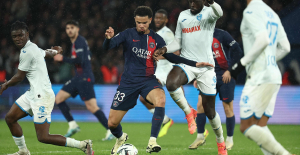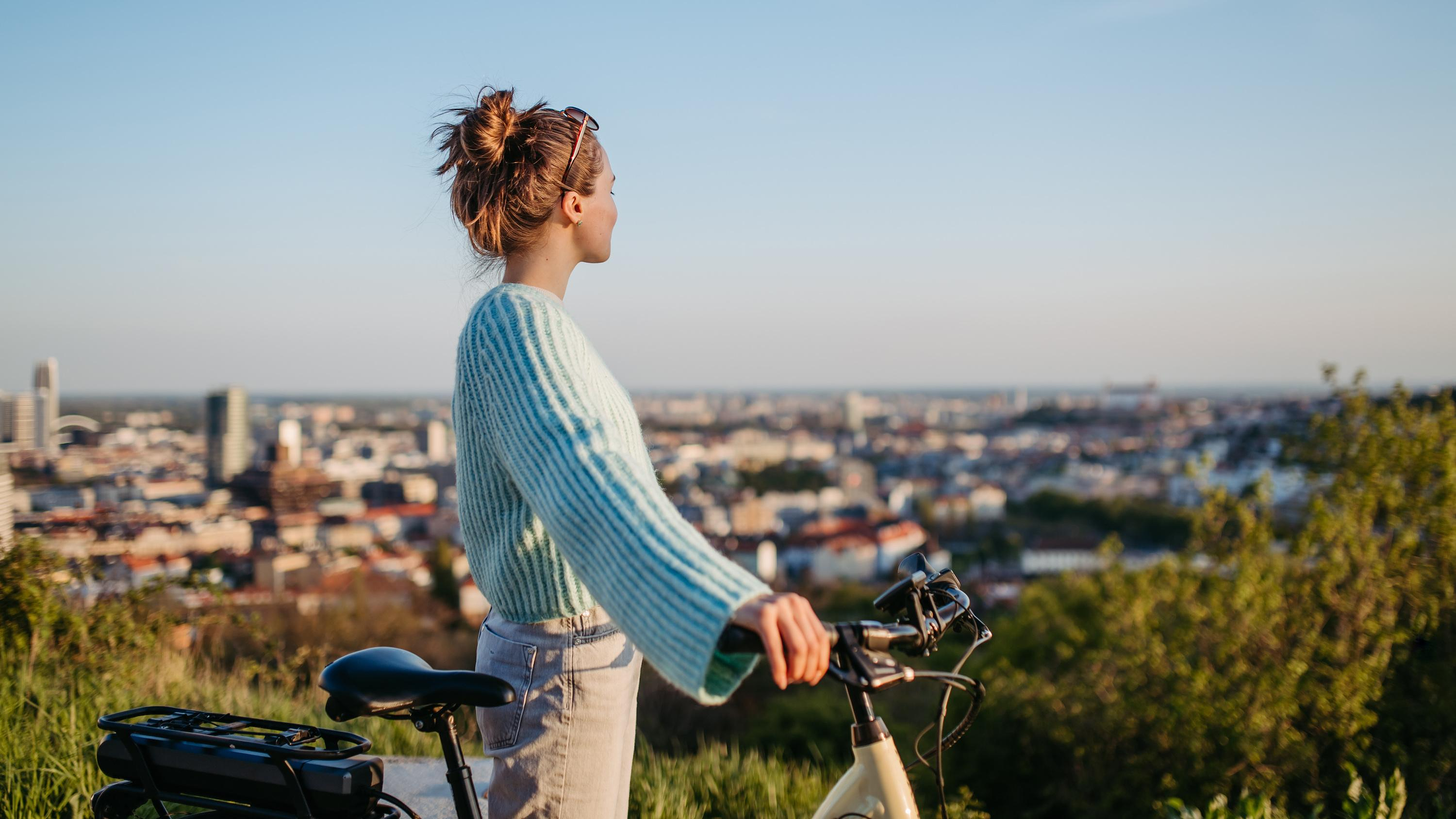“Am I not destroying my lungs?” asks Sofia as she pedals towards her office in a large urban center. The studies are clear: cycling is good for your health despite pollution and the risk of accidents. However, in the city, cyclists regret breathing air of variable and poor quality. For the WHO (World Health Organization) “air pollution is one of the greatest environmental risks to health”. Air pollution increases the risk of stroke, lung cancer, heart and respiratory conditions like asthma, and even psychiatric illnesses. But then, what reflexes should you adopt to take care of your health while cycling? Positioning at red lights, alternative routes... Le Figaro gives you some advice on how to best avoid pollution in the city.
“Fine particles are distributed along a gradient. The closer we are to road traffic, the more the concentrations of pollutants increase. Cyclists are more exposed than pedestrians, but less than people in cars,” reports Basile Chaix, research director at Inserm (National Institute of Health and Medical Research) who works on several health-related studies. public policy in the city, particularly in relation to the environment, mobility and health. “When we move a few meters away from traffic, we reduce the sources of exposure. Cycle lanes subject the cyclist to lower exposure than cycle lanes,” indicates Basile Chaix. Other recommendations make it possible to limit exposure to urban air pollution, such as staying away from the rear of trucks and buses with thermal engines. At red lights, there are spaces reserved for bicycles which allow them to move in front of cars, keeping them away from the exhaust pipes.
During a day with heavy air pollution or in an area with heavy road traffic, adapting your level of effort helps reduce the entry of pollutants into our body. “Appearance plays a role, especially in the most exposed areas. The greater the physical activity, the greater the volume of air inhaled. We must reduce the force of the effort in very polluted areas or times,” indicates the researcher. The cyclist can also adapt his route. “It may seem appropriate to take an alternative, less frequented route,” reports Basile Chaix, who specifies, however, that it is also necessary to take into consideration the safety equipment for the bicycles present on the route.
Also read: What are the best electric bikes? Discover our 2023 winners
Wearing a mask is not effective in protecting yourself from pollution in the city. A study by ANSES (National Agency for Food, Environmental and Occupational Health Safety) published in 2018 shows that laboratory measurements of the anti-pollution effectiveness of cyclist masks offered on the market are far from correspond to measurements in real conditions. For ANSES, the effectiveness of the mask depends on several parameters such as its adherence to the face, the types of particles filtered, the individual's lung ventilation rate, or the maintenance of the mask. To make matters worse, wearing a mask while cycling generates discomfort causing an increase in respiratory flow, favoring the entry of pollutants into the lungs. It could also, reports Basile Chaix, generate harmful changes in behavior: “when we wear a mask, we feel protected, so we will not respect other behavioral recommendations”.
In any case, even in the city the risk-benefit balance leans in favor of cycling rather than other modes of transport: “Serious studies are quite clear, cycling is recommended for physical activity. The gains in physical activity outweigh the risks linked to exposure to polluted air, accidents and noise levels,” emphasizes Basile Chaix.

 B:SM will break its investment record this year with 62 million euros
B:SM will break its investment record this year with 62 million euros War in Ukraine: when kyiv attacks Russia with inflatable balloons loaded with explosives
War in Ukraine: when kyiv attacks Russia with inflatable balloons loaded with explosives United States: divided on the question of presidential immunity, the Supreme Court offers respite to Trump
United States: divided on the question of presidential immunity, the Supreme Court offers respite to Trump Maurizio Molinari: “the Scurati affair, a European injury”
Maurizio Molinari: “the Scurati affair, a European injury” Irritable bowel syndrome: the effectiveness of low-carbohydrate diets is confirmed
Irritable bowel syndrome: the effectiveness of low-carbohydrate diets is confirmed Beware of the three main sources of poisoning in children
Beware of the three main sources of poisoning in children First three cases of “native” cholera confirmed in Mayotte
First three cases of “native” cholera confirmed in Mayotte Meningitis: compulsory vaccination for babies will be extended in 2025
Meningitis: compulsory vaccination for babies will be extended in 2025 In the United States, a Boeing 767 loses its emergency slide shortly after takeoff
In the United States, a Boeing 767 loses its emergency slide shortly after takeoff The A13 motorway will not reopen on May 1
The A13 motorway will not reopen on May 1 More than 1,500 items for less than 1 euro: the Dutch discounter Action opens a third store in Paris
More than 1,500 items for less than 1 euro: the Dutch discounter Action opens a third store in Paris 100 million euros in loans, water storage, Ecophyto plan… New measures from the executive towards farmers
100 million euros in loans, water storage, Ecophyto plan… New measures from the executive towards farmers Books poisoned with arsenic present in French libraries
Books poisoned with arsenic present in French libraries New York justice returns 30 works of art looted from Cambodia and Indonesia
New York justice returns 30 works of art looted from Cambodia and Indonesia Les Galons de la BD dedicates War Photographers, a virtuoso album on the Spanish War
Les Galons de la BD dedicates War Photographers, a virtuoso album on the Spanish War Theater: Kevin, or the example of an academic failure
Theater: Kevin, or the example of an academic failure Skoda Kodiaq 2024: a 'beast' plug-in hybrid SUV
Skoda Kodiaq 2024: a 'beast' plug-in hybrid SUV Tesla launches a new Model Y with 600 km of autonomy at a "more accessible price"
Tesla launches a new Model Y with 600 km of autonomy at a "more accessible price" The 10 best-selling cars in March 2024 in Spain: sales fall due to Easter
The 10 best-selling cars in March 2024 in Spain: sales fall due to Easter A private jet company buys more than 100 flying cars
A private jet company buys more than 100 flying cars This is how housing prices have changed in Spain in the last decade
This is how housing prices have changed in Spain in the last decade The home mortgage firm drops 10% in January and interest soars to 3.46%
The home mortgage firm drops 10% in January and interest soars to 3.46% The jewel of the Rocío de Nagüeles urbanization: a dream villa in Marbella
The jewel of the Rocío de Nagüeles urbanization: a dream villa in Marbella Rental prices grow by 7.3% in February: where does it go up and where does it go down?
Rental prices grow by 7.3% in February: where does it go up and where does it go down? Even on a mission for NATO, the Charles-de-Gaulle remains under French control, Lecornu responds to Mélenchon
Even on a mission for NATO, the Charles-de-Gaulle remains under French control, Lecornu responds to Mélenchon “Deadly Europe”, “economic decline”, immigration… What to remember from Emmanuel Macron’s speech at the Sorbonne
“Deadly Europe”, “economic decline”, immigration… What to remember from Emmanuel Macron’s speech at the Sorbonne Sale of Biogaran: The Republicans write to Emmanuel Macron
Sale of Biogaran: The Republicans write to Emmanuel Macron Europeans: “All those who claim that we don’t need Europe are liars”, criticizes Bayrou
Europeans: “All those who claim that we don’t need Europe are liars”, criticizes Bayrou These French cities that will boycott the World Cup in Qatar
These French cities that will boycott the World Cup in Qatar PSG: “Immense pride in continuing the adventure in Paris”, relishes Zaire-Emery
PSG: “Immense pride in continuing the adventure in Paris”, relishes Zaire-Emery Breaking: everything you need to know about this sport
Breaking: everything you need to know about this sport NBA: Lakers gain respite, Boston responds to Miami
NBA: Lakers gain respite, Boston responds to Miami Top 14: “a very severe red card”, estimates Labit (French Stadium)
Top 14: “a very severe red card”, estimates Labit (French Stadium)

















